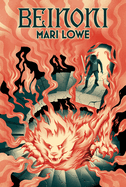
Middle-grade author Mari Lowe (Aviva vs. the Dybbuk; The Dubious Pranks of Shaindy Goodman) offers a profoundly nuanced speculative novel in Beinoni, an exploration of free will, tradition, and change through a distinctly Orthodox Jewish lens.
In 10 months, 12-year-old Ezra Safran will have his bar mitzvah and fulfill his destiny as the Nivchar, the chosen one. Then he will fight the gurya, a monstrous embodiment of evil, to preserve the Beinoni, "the in-between time, where no evil can endure." By all accounts, the world has been Beinoni for the past 70 years. Ezra, however, senses that something is wrong in both his insular community and in the wider world. He feels helpless in the face of bland reassurances from his father and other community elders--but Ezra soon realizes that if he doesn't start asking the important questions, no one will.
In Beinoni, Lowe explores Talmudic teachings and Jewish history in a modern context, deconstructing the "chosen one" narrative while pushing back against dogmatic traditionalism and encouraging intergenerational dialogue. The act of questioning is a central tenet of Judaism, and through Ezra's story, Lowe asks: If the world's people are to do good, should they not be given the opportunity to choose that path?
Beinoni is a unique urban fantasy featuring believable tween characters and dialogue. The multi-faceted, allegorical storytelling, however, may feel inaccessible for younger readers, especially non-Jewish ones. Certainly, understanding the history, cultural concepts, and layers of theological interpretation deepens one's appreciation of the narrative. But perhaps this is the best thing good literature offers its readers, whether over the course of a week or a lifetime: the chance to revisit, reinterpret, and discover anew. --Mariel Fechik, librarian, writer, artist

